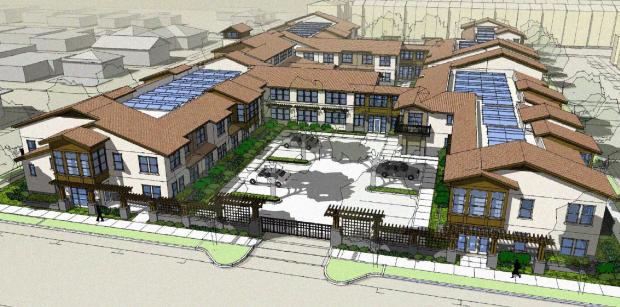| |
| |
E-Mail Forum – 2017 |
|
| |
< RETURN |
|
| |
Senior apartment project breaks ground at Richmond site of Japanese nurseries
May 24, 2017 |
|
|
| Senior apartment project breaks ground at Richmond site of Japanese nurseries
Miraflores Senior Apartments is part of a greater, 14-acre, master-planned development to include a market-rate, homeownership project.

Courtesy Eden Housing
Illustration of the 80-unit Miraflores Senior Apartments project now under construction at the site of former Japanese nurseries in Richmond.
By Tom Lochner | tlochner@bayareanewsgroup.com | Bay Area News Group
PUBLISHED: May 23, 2017 at 9:22 am | UPDATED: May 23, 2017 at 6:25 pm
RICHMOND — Ground has broken on Miraflores Senior Apartments, an 80-unit, nonprofit project on the former site of Japanese family-owned flower nurseries that survived beyond World War II.
The project will occupy a single, two-story wood-frame structure, on a 1.56-acre parcel at 4855 Wall Ave. at South 49th Street just west of Interstate 80. All but one of the apartments will be one-bedroom, with a kitchen, living area and full bathroom, each totaling a little over 500 square feet, and will be accessible to people in wheelchairs. The remaining apartment will be for an onsite manager. There will be a community room, outdoor courtyard garden, computer lab, fitness room and laundry room.
Miraflores Senior Apartments is part of a 14-acre, master-planned development that also will include a market-rate, homeownership project, said Nathan Ho, policy and communications manager for Hayward-based Eden Housing, one of the partners in the senior apartment project. The other is Richmond-based Community Housing Development Corp.
Miraflores Senior Apartments is expected to be completed by 2019, according to Eden.
Mayor Tom Butt and Contra Costa County Supervisor John Gioia were among the dignitaries who took part in a May 15 ground-breaking ceremony for the senior apartments.
The greater, 14-acre site was once occupied by the greenhouses of the Sakai, Oishi and Maida-Endo nurseries beginning in the early 1910s. The nurseries somehow survived the forced relocation of the West Coast’s Japanese American population to remote desert internment camps after the bombing of Pearl Harbor, resuming business after World War II, and continuing in operation until about 2003.
Several of the structures from the Japanese flower industry days — a greenhouse, a water tower, and the Sakai Family Home — will be preserved, to be located on the market-rate part of the greater, master-planned development, according to Ho. The overall project also calls for daylighting a 750-foot section of Baxter Creek, creation of a new park to honor the history of the local Japanese flower industry, and building of a pedestrian-and-bicycle path connecting to the Richmond Greenway.
Some kind of project under the name Miraflores — roughly translated from Spanish, view of flowers — has been under discussion for the site for most of the current millennium. In mid-2008, this newspaper reported plans by the city and as many as three developers, including Eden, to develop 120 townhouses and 90 apartments at the site. In late 2009, the paper reported plans, “six years in the making,” for a 230-unit Miraflores development with 80 senior housing units and 150 market-rate units, and some retail. Those plans fell through at least partly as a result of that decade’s recession.
Additionally, years of use of pesticides and other substances by the nurseries contaminated the soil and groundwater, requiring extensive cleanup, including soil excavation, groundwater monitoring and removal of underground storage tanks.
In 2015, Miraflores Senior Housing was awarded $5.1 million by the California Strategic Growth Council as part of a $122 million round of affordable housing and transportation grants statewide, financed with Cap-and-Trade funds.
For more information on Miraflores Senior Apartments contact Eden at 510-582-1460 or visit its leasing office page.
|
|
| |
< RETURN |
|
|

